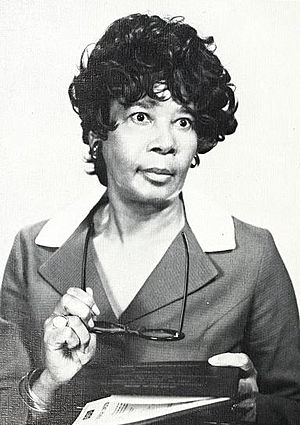Mary Fair Burks facts for kids
Mary Fair Burks (July 31, 1914 – July 21, 1991) was an important American teacher, writer, and activist. She played a big part in the Civil Rights Movement in Montgomery, Alabama. In 1946, Burks started the Women's Political Council, a group that helped kick off the Montgomery Bus Boycott after Rosa Parks was arrested in 1955.
Contents
About Mary Fair Burks
Mary Fair Burks was born in Montgomery, Alabama, on July 31, 1914. Her parents were Gustavus and Ollie Fair. She went to Alabama State University and earned a degree in English literature in 1933. She then got her master's degree in the same subject from Michigan State University in 1934.
After her studies, Burks returned to Montgomery. She taught English at Alabama State Laboratory High School. The school's principal, Nathaniel W. Burks, had been her professor. They later married and had a son, also named Nathaniel W. Burks, who became a doctor. Mary Burks became the head of the English department at Alabama State College in the late 1940s and early 1950s.
Her Continued Education
Mary Burks kept learning throughout her life. She earned her doctorate in education from Columbia University. She also did more studies at famous universities like Harvard and Oxford.
Life After Alabama State College
In 1960, Burks left Alabama State College. This happened after several professors were fired for being involved in civil rights issues. Among those fired was Jo Ann Robinson. Robinson was a close friend and a fellow member of the Women's Political Council.
After the Civil Rights Movement ended, Burks moved to Salisbury, Maryland. She was very active in her new community. She started two historical groups for African Americans. She also volunteered at a local hospital and joined the Maryland Arts Council. In 1979, she was chosen to be on a special panel for the National Endowment for the Humanities. She also taught literature at the University of Maryland Eastern Shore until she retired in 1986. Mary Fair Burks passed away on July 21, 1991.
Her Published Works
Mary Fair Burks wrote many literary pieces. She wrote a review of James Baldwin’s If Beale Street Could Talk. She also wrote articles about Toni Morrison and other Black authors. In 1976, her article "The First Black Literary Magazine in American Letters" was published.
In 1991, Burks helped write a book called "Women in the Civil Rights Movement: Trailblazers and Torchbearers." This book had parts written by different authors. Burks wrote the section about the "Montgomery Bus Boycott."
The Women's Political Council
In 1935, Mary Burks had a difficult experience with a white driver. This led to her arrest by a white police officer. This event showed her how much racism was present in Montgomery. She had felt somewhat protected from it because of her education and position. This incident inspired Burks to work for racial equality in Montgomery.
Starting the WPC
A year later, in 1946, she founded the Women's Political Council (WPC). The WPC worked to encourage people to get involved in their community. They also wanted more people to register to vote. They spoke to city officials to change unfair racist rules. When it started, the group had about 50 African American community members. These members included teachers, nurses, and social workers. Burks later wrote that she created the council because of "scars [she] suffered as a result of racism."
The WPC and the Montgomery Bus Boycott
In 1950, Burks stepped down as president of the WPC. She said the job was very demanding, and she had been in charge longer than she planned. Her friend and colleague, Jo Ann Robinson, took over as president. Burks continued to work closely with Robinson and remained active in the group.
Robinson changed the WPC's focus to the unfair treatment of African Americans on public transportation, especially buses. From 1955 to 1956, Burks and the WPC helped start and support the Montgomery Bus Boycott. This boycott began after Rosa Parks was arrested for refusing to give up her seat on a bus.
After the Civil Rights Movement ended, Burks highlighted how important the WPC was in starting the Montgomery Bus Boycott. She believed it helped begin the entire movement. Burks said that "Rosa Parks, Jo Ann Robinson, and members of the Women’s Political Council were trailblazers." She called Martin Luther King, Jr. a "torchbearer," explaining that a torchbearer "follows the trailblazer."
 | Georgia Louise Harris Brown |
 | Julian Abele |
 | Norma Merrick Sklarek |
 | William Sidney Pittman |


